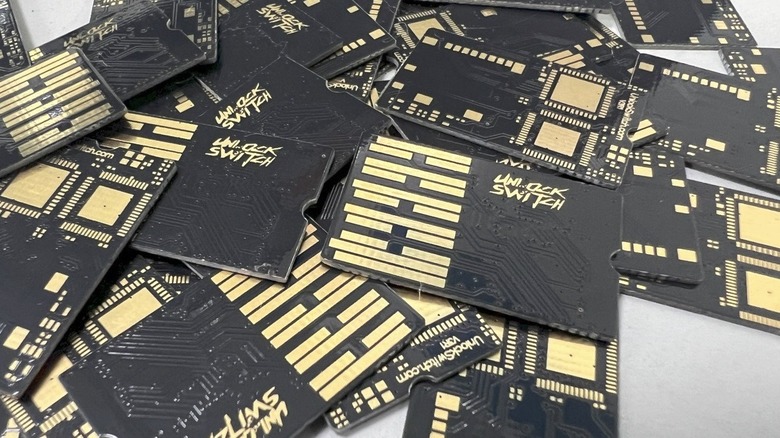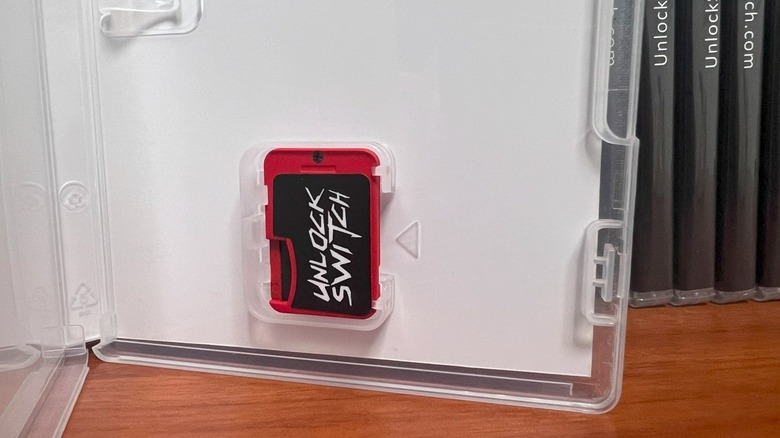Why The UnlockSwitch Is So Controversial Among Nintendo Fans
With over 141 million units sold as of this writing, the Nintendo Switch is far and away one of the best-selling video game consoles of all time. Launched in 2017, it came on the heels of a pair of inconsistent decades for the Japanese video game giant when it came to the success of its home consoles. In the handheld space, though, nobody came close to Nintendo's success, so when the Switch was unveiled as a console/handheld hybrid, it made perfect sense to give the company a fresh start.
For the bulk of the console's existence, if gamers wanted to tinker with their Switches to run unsigned code like homebrew games or unauthorized copies of commercial games, it required various forms of hacks, some of which required physical hardware modifications. That changed around the start of 2024, when the Switch finally got the MIG Switch, a Switch counterpart to the flash carts that were popular on the Nintendo DS series of portable consoles. A flash cart is a cartridge that can be loaded up with game ROMs — commercial or homebrew — for a given console, usually on a microSD card, and played on unmodified hardware.
After about three months on the market, though, MIG Switch was thrown a curveball with the announcement of UnlockSwitch, a rival flash cart. All hell broke loose, with MIG Switch alleging behind the scenes that UnlockSwitch was a scam and UnlockSwitch responding in public. It's a lot to digest, so let's take a dive into where things stand.
UnlockSwitch emerges
During the early part of April 2024, someone claiming to be behind a rival Switch flash cart, UnlockSwitch, emerged with a series of posts on X, formally known as Twitter. At least as of April 13, the account was claiming that no units, not even samples, were available yet, saying that anyone offering pre-orders at that point was a scammer. Within a few weeks, UnlockSwitch got some samples into the hands of YouTubers like Nick Moses for review, only for the MIG Switch team to contact Moses a few days later. At that point, they told him that the carts UnlockSwitch was sending out were just relabeled early MIG Switch samples and that there would be no product for anyone who pre-ordered.
UnlockSwitch responded on April 23, tweeting that they had no intentions of offering pre-orders, instead waiting until the initial manufacturing run of flash carts had been produced before making anything available for sale. This followed up an earlier claim on their part that UnlockSwitchStore.com, which was offering pre-orders, was an unaffiliated scam website. UnlockSwitch also claimed, meanwhile, that the final product would use a distinct chipset and design, theoretically proving that they had genuinely reverse engineered their predecessor. It's unclear if they meant distinct from the MIG Switch, the early samples, or both, though.
UnlockSwitch responds in detail to MIG Switch
On April 29, UnlockSwitch released a more detailed response, a four-page PDF that they linked from a post on their X account. Much of it stresses that once the production units are available, they will make them available for as much scrutiny as possible to show that they're not simply relabeled MIG Switch carts, and also that they think that the MIG Switch team is just scared of competition that's undercutting its price point. Perhaps most interestingly, the letter made reference to a third Switch flash cart in development and how the UnlockSwitch team wasn't afraid of it, suggesting that their MIG Switch rivals would be.
The most newsworthy part was probably that UnlockSwitch also accused the MIG Switch team of launching UnlockSwitchStore.com themselves to direct customers to a MIG Switch distributor. This apparently wasn't overly paranoid on their part, as around April 24, UnlockSwitchStore.com changed from a pre-order site — already deemed a scam by UnlockSwitch — to a site apologizing for its previous state and deriding UnlockSwitch as a scam. And yes, underneath that message, they directed visitors to MIG Switch's "verified distributors." Further down the page, they also included a screenshot of a purported email from MIG Switch that claimed they tested a review sample that had been forwarded to them and confirmed as using MIG-Switch chips.


